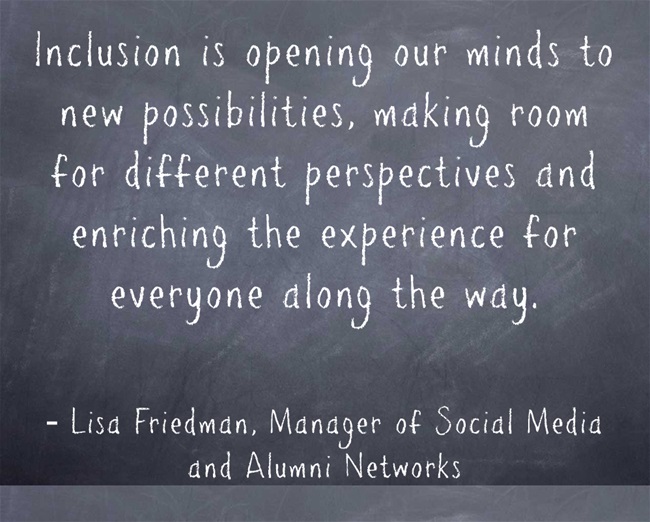 One of the best aspects of having Jonathan Mooney offer the keynote to launch a Matan Institute is the way in which he helps us to reframe our thinking about inclusion and what it means to have a disability. Hang on, I’ll come back to Jonathan in a moment.
One of the best aspects of having Jonathan Mooney offer the keynote to launch a Matan Institute is the way in which he helps us to reframe our thinking about inclusion and what it means to have a disability. Hang on, I’ll come back to Jonathan in a moment.
One of the other things that we do early on in an Institute is to guide educators to understand learning styles, starting with their own, in order to better recognize the diverse needs of the students that they serve. Understanding how we process information serves two purposes: it helps us seek out ways to make our own personal learning most relevant and it allows us to be aware of the fact that others process differently.
One of the ways that I process my own professional learning best is through Twitter. Yes, you read that correctly; I use Twitter to process a professional learning session. The use of Twitter is a growing trend in professional development for educators. If you are ready to dismiss this idea out of hand I would suggest reading this article. And if you are skeptical because you think you “don’t have the time to invest in more social media”, I’d suggest reading this one.
Twitter is meant to be a conversation. It’s not a bulletin board of ideas and self-promotion, but rather a way to engage in a broad conversation with diverse educators around the world on a common topic or theme.
 Now, let’s go back to Jonathan’s keynote. As I mentioned, he is gifted is guiding us to rethink what it means to have a disability and, therefore, what it means to be truly inclusive. Here are my insights from his most recent keynote in the form of tweets:
Now, let’s go back to Jonathan’s keynote. As I mentioned, he is gifted is guiding us to rethink what it means to have a disability and, therefore, what it means to be truly inclusive. Here are my insights from his most recent keynote in the form of tweets:
Jonathan Mooney is kicking off the #MatanInst in fine style. #blessed #dyslexia #inclusion
Mooney shares how his son, who struggles w/ reading, is included, celebrated & transformed through successful Jewish education. #MatanInst
Mooney spent high school hiding in the bathroom to avoid reading out loud. #MatanInst #dyslexia
Mooney: Told he would amount to nothing more than high school drop out, flip burgers and/or probably wind up in jail. #MatanInst #dyslexia
When asked “How did you do it?” Mooney cites deep commitment from specific individuals in his life. #inclusion #dyslexia #MatanInst
Mooney: Foundation of #inclusion: ppl don’t have #disabilities but differences, & become disabled by the way others treat them #MatanInst
On social stigma of learning & attention differences: the way we are treated based on our differences stays w/us. #MatanInst #dyslexia #ADHD
Mooney: What I overcame wasn’t my #dyslexia, it was believing that I was dumb. #MatanInst
Inclusive environments challenge the narrow definition of intelligence. Instead they ask: “How is that kid smart?” #MatanInst #inclusion
Mooney: I didn’t need someone to fix me. I needed someone to fight for me. #parenting #dyslexia #MatanInst #inclusion
Mooney: IEPs are deficit documents. We need to highlight strength. We all need to get good at something, not everything. #MatanInst
There’s a difference btwn #inclusion & #tolerance. Tolerance is one way, inclusion is reciprocal. Inclusion celebrates difference #MatanInst
Mooney: Embrace the idea that normal is a myth. Another perspective: jewishspecialneeds.blogspot.com/2015/03/normal… #MatanInst #normal #dyslexia
Only normal ppl are ones you haven’t met. Each person you know is defined by idiosyncrasies & eccentricities that make them human #MatanInst
And from participants:
lailahtov7: Normal is not a factor in the world that we discover, it’s a construct that we create @MatanInc #Inclusion
rabbiLP: Inspired by Jonathan Mooney’s presentation. My takeaway / “change the environment because we can”.
It is different, to be sure, than reading a traditional summary. But think about it, now these ideas don’t just live in a document on my laptop or in a small journal used only for note taking. These ideas live in a space where others can and will find them. Even better, others can reply to them and keep the conversation going.
Isn’t that what Mooney’s message and the Matan Institute is really all about – thinking differently? Inclusion is opening our minds to new possibilities, making room for different perspectives and enriching the experience for everyone along the way.
 Lisa Friedman is Matan’s Manager of Social Media and Alumni Networks. She is also an Education Director at a Reform congregation in Central New Jersey where she oversees the synagogue’s and religious school’s inclusive practice.
Lisa Friedman is Matan’s Manager of Social Media and Alumni Networks. She is also an Education Director at a Reform congregation in Central New Jersey where she oversees the synagogue’s and religious school’s inclusive practice.
